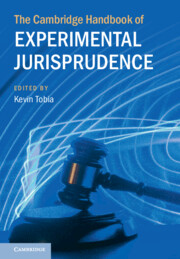Book contents
- The Cambridge Handbook of Experimental Jurisprudence
- The Cambridge Handbook of Experimental Jurisprudence
- Copyright page
- Contents
- Contributors
- Acknowledgments
- Dedication
- Part I Foundations and Theory
- Part II Introductions
- Part III Applications
- 23 Moral Judgments about Retributive Vigilantism
- 24 How Much Harm Does It Take? An Experimental Study on Legal Expertise, the Severity Effect, and Intentionality Ascriptions
- 25 Human Perceptions of AI-Caused Harm
- 26 Reasonableness from an Experimental Jurisprudence Perspective
- 27 The Meaning of “Reasonable”
- 28 Commonsense Consent and Action Representation
- 29 Who Caused It? Different Effects of Statistical and Prescriptive Abnormality on Causal Selection in Chains
- 30 Ownership for and against Control
- 31 Examining the Foundations of the Law of Judicial Bias
- 32 The Promise and the Pitfalls of Mock Jury Studies
- 33 Legal Interpretation as Coordination
- 34 Legal Ambiguities
- 35 Cross-Cultural Perceptions of Rights for Future Generations
- 36 The Right to Transgender Identity
- 37 The Legal Conductome
- 38 Trial by Internet
- Index
28 - Commonsense Consent and Action Representation
What Is “Essential” to Consent?
from Part III - Applications
Published online by Cambridge University Press: 17 May 2025
- The Cambridge Handbook of Experimental Jurisprudence
- The Cambridge Handbook of Experimental Jurisprudence
- Copyright page
- Contents
- Contributors
- Acknowledgments
- Dedication
- Part I Foundations and Theory
- Part II Introductions
- Part III Applications
- 23 Moral Judgments about Retributive Vigilantism
- 24 How Much Harm Does It Take? An Experimental Study on Legal Expertise, the Severity Effect, and Intentionality Ascriptions
- 25 Human Perceptions of AI-Caused Harm
- 26 Reasonableness from an Experimental Jurisprudence Perspective
- 27 The Meaning of “Reasonable”
- 28 Commonsense Consent and Action Representation
- 29 Who Caused It? Different Effects of Statistical and Prescriptive Abnormality on Causal Selection in Chains
- 30 Ownership for and against Control
- 31 Examining the Foundations of the Law of Judicial Bias
- 32 The Promise and the Pitfalls of Mock Jury Studies
- 33 Legal Interpretation as Coordination
- 34 Legal Ambiguities
- 35 Cross-Cultural Perceptions of Rights for Future Generations
- 36 The Right to Transgender Identity
- 37 The Legal Conductome
- 38 Trial by Internet
- Index
Summary
Recent empirical work demonstrates that some instances of material deception are perceived by ordinary people as consent-defeating, whereas other instances are not. One hypothesized account of these divergent lay intuitions draws on the notion of “essence”: Roughly speaking, lies that pertain to the “core” or “nature” of a consented-to act are perceived as precluding consent, whereas lies that pertain to features that are “nonessential” or “collateral” to the act are perceived as compatible with consent. To assess this hypothesized account, an independent measure of “essence” – one that does not rely with problematic circularity on notions of consent – is needed. This chapter draws on an emerging cognitive science literature that deploys linguistic probes to investigate how people intuitively represent human action. Here, we will consider two such probes, the “by” test and the “basically doing” test, and observe that whereas the former predicts judgments of consent, the latter does not.
Information
- Type
- Chapter
- Information
- The Cambridge Handbook of Experimental Jurisprudence , pp. 464 - 480Publisher: Cambridge University PressPrint publication year: 2025
